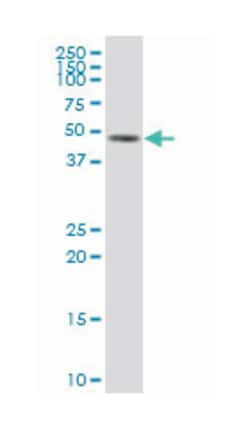Learn More
potassium inwardly-rectifying channel, subfamily J, member 11, Mouse, Polyclonal Antibody, Abnova™
Mouse polyclonal antibody raised against a partial recombinant KCNJ11.
Supplier: Abnova Corporation H00003767A01
Description
Potassium channels are present in most mammalian cells, where they participate in a wide range of physiologic responses. The protein encoded by this gene is an integral membrane protein and inward-rectifier type potassium channel. The encoded protein, which has a greater tendency to allow potassium to flow into a cell rather than out of a cell, is controlled by G-proteins and is found associated with the sulfonylurea receptor SUR. Mutations in this gene are a cause of familial persistent hyperinsulinemic hypoglycemia of infancy (PHHI), an autosomal recessive disorder characterized by unregulated insulin secretion. Defects in this gene may also contribute to autosomal dominant noninsulin-dependent diabetes mellitus type II (NIDDM), transient neonatal diabetes mellitus type 3 (TNDM3), and permanent neonatal diabetes mellitus (PNDM). [provided by RefSeq
Sequence: RTSYLADEILWGQRFVPIVAEEDGRYSVDYSKFGNTVKVPTPLCTARQLDEDHSLLEALTLASARGPLRKRSVPMAKAKPKFSISPDSLSSpecifications
| potassium inwardly-rectifying channel, subfamily J, member 11 | |
| Polyclonal | |
| Mouse polyclonal antibody raised against a partial recombinant KCNJ11. | |
| KCNJ11 | |
| BIR/HHF2/IKATP/KIR6.2/MGC133230/PHHI/TNDM3 | |
| Mouse | |
| 50 μL | |
| Yes | |
| 3767 | |
| Store at -20°C or lower. Aliquot to avoid repeated freezing and thawing. |
| ELISA, Western Blot | |
| Unconjugated | |
| 50% glycerol | |
| NM_000525 | |
| KCNJ11 | |
| KCNJ11 (NP_000516, 301 a.a. ∼ 390 a.a) partial recombinant protein with GST tag. | |
| RUO | |
| Primary | |
| Human | |
| Serum |
Your input is important to us. Please complete this form to provide feedback related to the content on this product.
